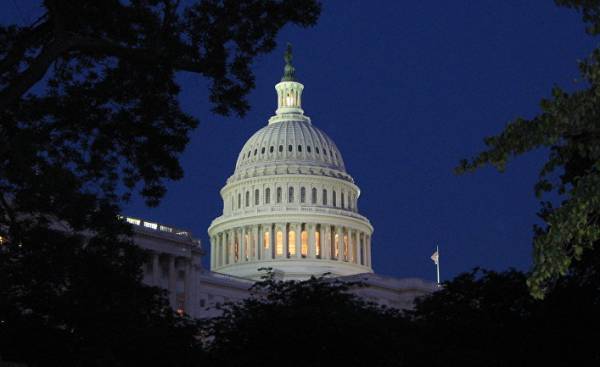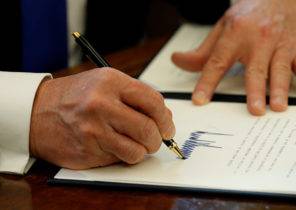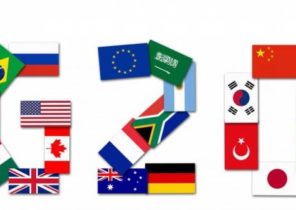
The edition of the Washington Post reports:
According to those who lead the negotiations on the legislative process, senators have concluded an agreement to this week to submit to a vote a comprehensive draft law on sanctions against Russia.
This measure will be tied to a bill to toughen sanctions against Iran. It includes proposals for codification of existing sanctions against Russia, the introduction of punitive measures against Moscow in light of the aggressive activities of Russia in Ukraine, implementation of measures regarding the situation in Syria and the scope of cyberhackers, and granting Congress the ability to control attempts by the administration to ease sanctions against Russia before they are approved…
Measures, submitted Monday night, provide for sanctions against defense and intelligence apparatus of Russia and part of its energy, mining, Railways and shipping. They also include provisions on the punishment of persons implicated in corruption and human rights violations.
The bill contains an unusual clause that allows Congress to interfere with the attempts of the White house to lift sanctions against Russia. This can be seen as a vote of confidence from the Republicans of the Senate in the matter of the President’s policies trump against Russia.
In a written statement, which reported the agreement, a Democrat from the Senate Committee on foreign relations Benjamin Cardin (Benjamin L. Cardin) noted that the bill contains a requirement for Congress to conduct a “authorized check in case, if sanctions are eased, suspended or cancelled”.
Codification of existing sanctions imposed under Executive order of the President, is another way to deprive trump of freedom of action. As explained Cardin, the new sanctions will affect “corrupt Russians, those who seek to evade sanctions, who is responsible for serious human rights violations, who is supplying weapons to the regime of Bashar al-Assad who is committing crimes in cyberspace on behalf of the Russian government who are involved in the unfair privatization of state assets, who does business with Russian intelligence and defense sector.”
Sanctions may affect “key sectors of the Russian economy, including mining, steel, shipping and rail industry.” Despite the reluctance of Secretary Rex Tillerson (Rex Tillerson) to actively promote democracy, this bill requires “active assistance in strengthening of democratic institutions and countering misinformation in the countries of Central and Eastern Europe, are vulnerable to the aggression and intervention of Russia”. The bill also stipulates the need to assess the level of corruption and economic crimes in Russia.
Guru sanctions Makr of Dubowitz (Mark Dubowitz) was very happy: he praised the “directed financial blow of the United Congress against the two most hostile powers that threaten international order.” According to him, the part of the bill, which relates to Iran, “acting against the Praetorian guard of the Islamic revolution guards Corps through tough sanctions designed to fight against terrorist organizations, the supply of missiles and repression in the country.” As for the part where we are talking about Russia, Dubowitz noted the focus of the bill on the “search sources and networks that contribute to the conduct of military, political and media campaign aimed at undermining the foundations of our free society.”
Oddly enough, we still don’t know what think about all this White house. (When Corker was asked whether the White house such measure, he, after some hesitation, replied: “I believe that the administration is, at least, to seriously consider the opportunity to support this bill.”) Because there is a likelihood that the bill will be approved by an overwhelming majority that would deny the President the opportunity to veto, the White house now has almost no value. The overcoming of the threshold, the veto will complete the picture of the decline of authority, which are unable to establish contact even with leaders of his own party in Congress. The irony is that the only important bill of this Congress deals with the issue that trump has not shown the slightest interest and in which he does not want to intervene.
In any case, the minority leader Charles Schumer (Charles E. Schumer) also praised the agreement. “By codifying existing sanctions and prescribing the need for Congress to validate any decision on easing or lifting these sanctions, we guarantee that the U.S. will continue to punish President Putin for his irresponsible and destabilizing actions. These additional sanctions will also be a strong signal to Russia and any other country that may try to interfere in our elections, a signal that they will be punished.”
This bill was a major victory for the Chairman of the Senate Committee on foreign relations Bob Corker (Bob Corker), which not long ago was one of the candidates for the position of Secretary of state and majority leader Mitch McConnell (Mitch McConnell), who was a strong supporter of sanctions against Russia. Their achievement once again pointed us to the fact that if you remove the trump, the positions of the two parties coincide on many issues of foreign policy. Agree with trump or not, the need to increase pressure on Russia became the question that is now able to unite Republicans and Democrats. Russian will be extremely disappointed that their attempts to influence the outcome of U.S. presidential elections did not help them to get rid of the sanctions.







